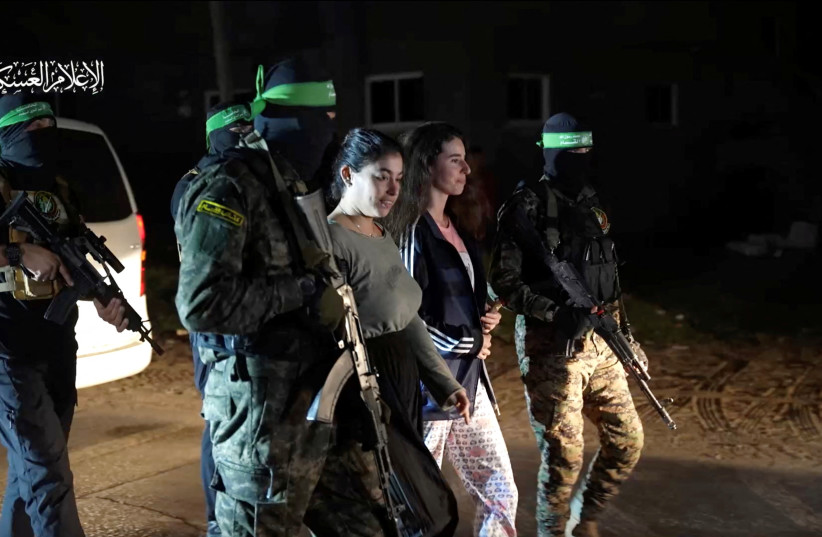Editor’s Notes: Israel must not ignore Qatar – our only hope?
For the first time, an Israeli newspaper held a conference where they interviewed a Qatari official. In this case, it was Qatar’s Ambassador to Germany, Abdulla bin Mohammed bin Saud Al Thani.
This is not something that we take lightly. This is a historic event.
We were approached by the Qatari government, who said that they would like to participate in the Joint Perspectives conference that The Jerusalem Post held in cooperation with WELT, an Axel Springer SE publication.
Qatar ultimately wanted to express, through the ambassador, its stance as a central mediator in this war. This was not unlike teenagers feeling misunderstood and underappreciated for their massive effort.
The rest of the world, however, sees Qatar as a demon, even though they are the ones that mediated the previous hostage deal, during which 105 captives were released gradually during an eleven-day ceasefire back into Israel.

Israelis also see Qatar as a demon: as a country funding terror, funding anti-Israel academic courses in the United States, and as being an enemy of the state. Behind the scenes, however, there have been relationships between Doha and top Israeli officials from every sector, in a very positive and helpful way.
For example, during the interview with the ambassador, he revealed that he went to the US Army War College with a then-young Israeli military officer named Gadi Eisenkot – who later became IDF chief of staff and is currently a member of Knesset and an observer in Israel’s war cabinet.
The two government officials are still in touch and maintain a close relationship, meeting regularly. When Eisenkot tragically lost both his son and nephew during this war, the Qatari ambassador consoled him, expressing his sincere sorrow for the loss of his fellow alumnus.
Al Thani has been to Israel numerous times. He has met with Prime Minister Benjamin Netanyahu and the heads of Israel’s security bodies and telecom giants back when he was board of directors chairman for Ooredoo Group, a Qatari telecom company.
The ambassador has met with more than 20 individuals whose loved ones either were or are still in Gaza, a high percentage of whom were released following his request through the Qatari government with the terrorist organization Hamas that abducted them.
He explained that when several ambassadors from major Western countries make requests for the release of hostages, Hamas folds – which is what has happened so far.
Another exciting aspect was expressing his views on Al Jazeera, an Arab world media giant based in and funded by Qatar with explicit biases against Israel.
Ambassador said Al Jazeera should be more balanced
The ambassador revealed that he believes there should be more balance in Al Jazeera by way of interviews with the IDF chief of staff and other such leaders.
He also agreed to meet with Meirav Leshem Gonen, the mother of young hostage Romi, onstage at the conference. I stood beside them and noticed them whispering to each other; later, they sat and spoke at eye level on the sidelines.
Is Qatar a country with which we identify ideologically? Of course not. We have many issues with the Qatari government, whether it be about their ties with Hamas, influencing anti-Jewish rhetoric, and so on.
But how is that different from other countries where we have mended our relationships, such as Jordan and Egypt?
On the other hand, there are many similarities. There is the religious aspect in which Israel is slowly becoming a more conservative, religious state. The official religion of Qatar is Sunni Islam.
Our cultures are also similar: warm, hospitable, and open to complex discussions.
We cannot ignore Qatar. They are a significant player in the Middle East playing field and possibly can provide the only chance we have to bring the hostages back now.
Qataris have just recently understood that they must do hasbara (public relations) of sorts to explain their efforts in several fields, something they have not been used to doing until now due to being under the radar and distanced from the limelight.
For example, only in the past few weeks has their prime minister, Sheikh Mohammed bin Abdulrahman bin Jassim Al Thani, begun giving interviews to the international media. Qatar understands now that its vitality was not being perceived.
Qatar has an outstretched hand to create dialogue – let’s take it. We won’t agree on everything, and we will call out actions we disapprove of. But if we do this through direct dialogue, we can make a difference.





Comments are closed.